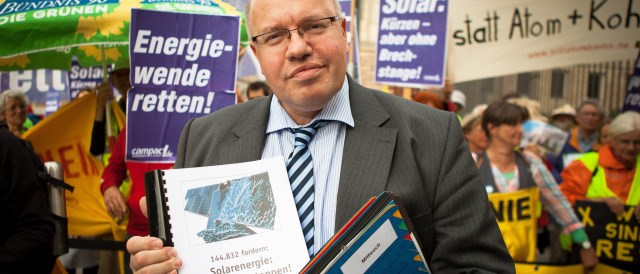International commentators have often taken domestic criticism concerning the Energiewende as proof for a lack of public support. Martin Brandt argues that criticism of the German Energy Transition is part of a long-term development and innovation process.

Federal Minister for the Environmental Altmaier accepting a petition to prevent stark cuts to the existing feed-in tariff in 2012. (by campact, CC BY-NC 2.0)
Germany’s decision to close all of its nuclear power plants by 2022 is now facing strong opposition. Interestingly enough, this criticism is directed at the Renewable Energy Source Act (Erneuerbare Energien Gesetz, EEG), currently viewed as a model for the rest of the world. The EEG advocates the creation of strong internal markets, green awareness throughout society, and the achievement by Germany of worldwide leadership in the green business.
In 2008, the EEG helped to save EUR 1.5 billion in energy generation costs and roughly EUR 5 billion in external costs (climate damage), as well as cutting carbon dioxide emissions by more than 53 million tonnes. In addition, the renewable energy sector now employs 400,000 people (source: BMU – Bundesumweltministerium; the Federal Ministry for the Environment, Nature Conservation and Nuclear Safety). Why, then, is the existing EEG being called into question?
The virtue of constructive criticism
One answer lies in the current national election campaign. The rapid rise in electricity prices means that the energy policy reform is affecting ordinary Germans. Accepting change is now a matter of everyday reality. The German federal (Bundestag) elections, to be held in autumn 2013, are only adding to the sensitivity of this subject. It has now become a populist issue, which the political parties can use to create clear blue water between each other. However, a short-term election campaign could jeopardise the long-term success of the energy policy reform.
It’s not news that the EEG and the related energy policy reform are drawing flak. As early as 2010, the BMU responded to sceptics and, in its own opinion, refuted their arguments (EEG – Kritik und Missverständnisse: in German).
The BMU agrees that questions should continue to be asked about the EEG, in order to ensure that the act is continuously improved in a constructive manner. For this reason, the EEG is being reviewed on a regular basis and adjusted in accordance with the prevailing market conditions. A current example of this is the market-oriented reduction in direct support for photovoltaic electricity.
Characteristics of renewable advancements
When examining the overall development and innovation process for Germany’s renewable energy sources, the critical comments presented thus far should be placed in a wider context. Crises are clearly part of the innovation process and, in this case, also form part of the development of renewable energy solutions. They may even be indispensable. Crises also play a salutary role. This can be seen in the 2010 report on innovation activities related to renewable energy sources, commissioned by the BMU from the TU Berlin (Technishe Universität Berlin). In principal, the report was able to identify six phases in renewable energy innovation processes.
At the crossroads of innovation crisis
In Germany, a renewable energy source innovation crisis seems to have emerged from the discussion on electricity costs and objections to the construction of electricity transmission networks. So far, such crises have been very short-lived. However, there is also a danger of a shift or interruption in development, creating an unstable situation that might spook operators in the sector. Crises pose a threat to the maintenance of the political will to support innovation, and could bring an end to policy steering. Hopefully, experiences gained so far in developing renewable energy innovations will prove educational. On a positive note, this crisis can be viewed as part of a long-term learning and development process, in the pursuit of a green energy supply.
This article was first published on the Finnish Innovation Fund’s (Sitra) website. The author, Martin Brandt, is an economist who has worked for the German-Finnish Chamber of Commerce (Saksalais-Suomalainen Kauppakamari) since 2006. The article solely reflects his private opinion on the subject.